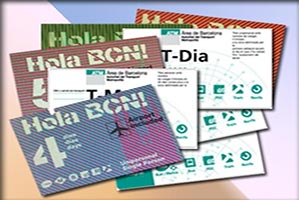
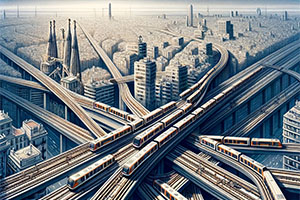
Barcelona metro lines
Which Barcelona metro lines to choose ?
Which lines to follow ?
-
Agbar Tower - Line L1
Airport - Line L9
Auditori - Line L1
Barcelona Aquarium - Lines L3, L4
Barcelona Zoo - Line L4
Beaches - Line L4
Bullring Shops - L1, L3, L8
Cable car - Line L3
Camp Nou - Lines L3, L5, L9
Casa Batllo - Lines L2, L3, L4
Casa Milà - Liness L3, L5, L6, L7
Casa Vicens - Lines L3
Cathedral - Lines L1, L4
Ciutadella parc - Lines L1, L4
Design museum - Line L1
Diagonal Mar shops- Line L4
Encants Market - Line L1
Fira of Montjuic - Lines L1, L3, L8
Forum - Line L4
Francia station - Line L4
Golondrinas - Line L3
Gothic Quarter - Lines L1, L3, L4, L6, L7
Gracia district - Lines L3, L4
Gran Via Fira - Lines L8, L9
Horta Labyrinth - Line L3
Joan Miro parc - Lines L1, L3, L8
Maremagnum shops - Line L3
Maritime museum - Line L3
Montjuic - Lines L1, L2, L3, L8
Montjuic funicular - Lines L2, L3
Monumental - Line L2
National Palace - Lines L1, L3, L8
North Station - Lines L1
Olympic Port - Line L4
Olympic stadium - Lines L1, L3, L8
Palau de la Musica - Lines L1, L4
Palau Reial - Line L3
Park Guell - Line L3
Passeig de Gracia - Lines L2, L3, L4, L5
Passeig Sant Joan - Lines L4, L5
Pedralbes Gardens - Line L3
Picasso museum - Line L4
Plaça Catalunya - Lines L1, L3, L6, L7
Plaça Reial - Line L3
Poble Espanyol - Lines L1, L3, L8
Port of Barcelona - Line L3
Ramblas - Lines L1, L3, L6, L7
RCD Espanyol stadium - Line L8
Sagrada Familia - Lines L2, L5
Sant Pau - Lines L4, L5
Sants station - Lines L3, L5
Tibidabo - Line L7
Triumphal arch - Line L1
Wax museum - Line L3
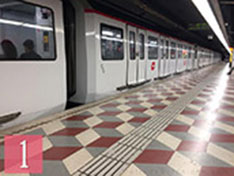
Barcelona metro L1
The Barcelona metro's L1 line, red-coloured line, stretches from the town of l'Hospitalet de Llobregat to the municipality of Santa Coloma de Gramenet over a total of 30 stations.
The line 1 not only makes it easy to get to the heart of Barcelona by reaching the Universitat, Catalunya or Urquinaona stops which flank a large number of tourist sights such as the Ramblas, Passeig de Gracia, Plaça Catalunya or the Gothic Quarter, but it also provides access to the foot of the Arc de Triomph, which leads the way to the Parc de la Ciutadella, and to the Plaça de Les Glories, which provides access to the city's flea market, not forgetting the access to Montjuic hill and its cultural treasures by getting off at Espanya metro station.
This metro line is very well connected with the trains from Sants station and Plaça Espanya, as well as tramway lines T4, T5 and T6, and numerous bus and metro lines.
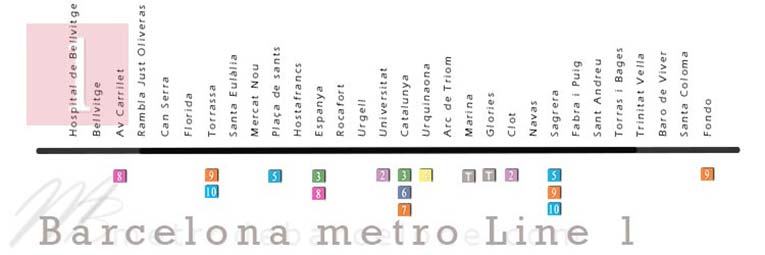
On this metro line
-
Olympic Stadium
Agbar Tower
Gothic Quarter
Arch of Triumph
The Cathedral
Ciutadella Park
Plaça Espanya
-
The Ramblas
The Rambla Catalunya
Joan Miro park
Plaça Catalunya
Montjuic
Palau de la musica
The Auditori
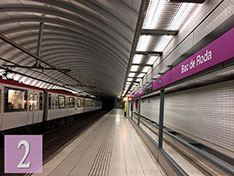
Barcelona metro line L2
Very convenient for getting from the Sagrada Familia to Montjuic hill very quickly, passing through the Passeig de Gracia and its must-see tourist sites such as the Casa Batllo or the Casa Milà (Pedrara), the Barcelona metro line L2 (purple colour line) runs over a total of 18 stations from the Paral-lel stop, to link the Catalan capital with the town of Badalona, via Sant Adrià de Besòs.
Thanks to its many connections, the Barcelona metro line L2 provides access to the tram network at Monumental station not far from the bullring of the same name, to the train lines via Passeig de Gracia or Clot stations, as well as the possibility of reaching the Montjuic funicular at the Paral-lel stop that in turn leads to the cable car that takes you up to the magnificent castle with its exceptional panoramic views of the city..
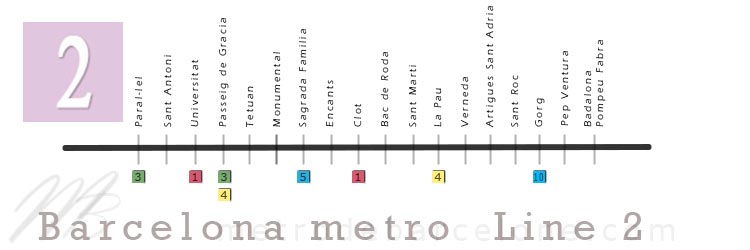
On this metro line
-
Sagrada Familia
Montjuic funicular
Passeig de Gracia
Casa Batllo
Plaça Tetuan
Monumental
Clot parc
-
The Ramblas
The Rambla Catalunya
Plaça Catalunya
Montjuic
Paral-lel Avenue
Apolo hall
Plaça Universitat
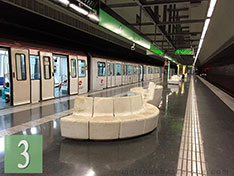
Barcelona metro L3
Of green colour, the Barcelona metro line 3 is one of the best ways to get to discover the Catalan capital.
Over a total of 26 stations that link the university area of the city to the Nou Barris district, the L3 line provides easy access to many of Barcelona's must-see attractions.
From the Palau Reial to Passeig de Gracia, via Espanya and Catalunya places, to continue through the Gracia district and ending with Guell and Horta's Labyrinth parks, this line of the Barcelona metro will take you as well as in the heart of the Ramblas, just a few stations from the Camp Nou, but also at the very edge of the Gothic Quarter.
This line is connected to the Barcelona tram network, to a host of Renfe and FGC trains, as well as the Montjuic funicular and cable car.
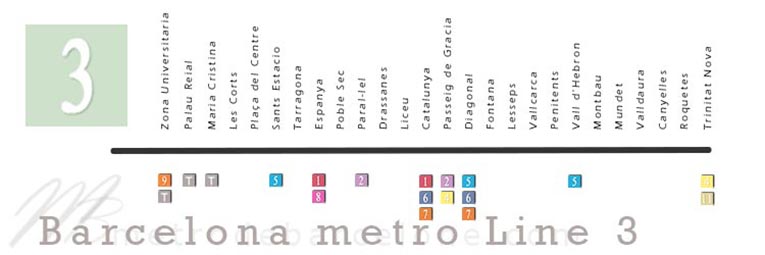
On this metro line
-
Port Vell
Park Guell
The Aquarium
Casa Batllo
Plaça Tetuan
Montjuic
Plaça Catalunya
-
Montjuic funicular
Passeig de Gracia
The Rambla Catalunya
Diagonal Avenue
The Apolo
Plaça Reial
Laberinto park
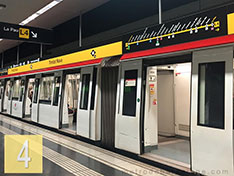
Barcelona metro L4
Along the beaches that stretch from San Sebastian to the Forum, passing through Bogatell or the Olympic Port, the line L4 (yellow line) runs from the Trinitat Nova district to La Pau, covering a total of 22 stations.
By the L4 line stations, you have, among other things, access to the Passeig de Gracia and its monuments designed by the famous Catalan architect Antoni Gaudi, to the Gothic Quarter, not far from the Cathedral, to numerous museums, such as the Picasso and Moco museums, as well as historical buildings such as the Cathedral del Mar.
Not far from the French station (Estació de França), this line is connected to a large number of train lines, as well as an access to the tram network via the Ciutadella Vila Olimpica, Selva de Mar, El Maresme / Forum or Besos stops.
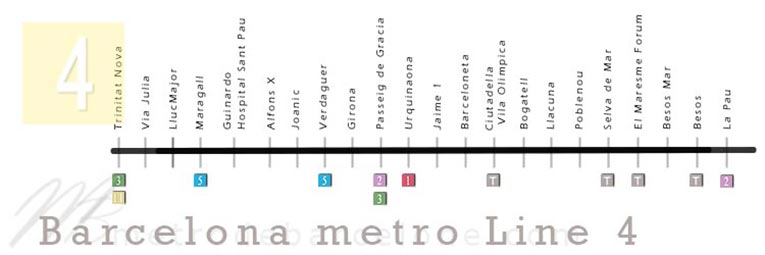
On this metro line
-
Olympic Port
Picasso Museum
Casa Batllo
Palau de la Musica
Zoo of Barcelona
Joan Miro Parc
Barceloneta
-
Plaça Catalunya
Passeig de Gracia
Santa Maria del Mar
Hospital Sant Pau
Forum
Gothic Quarter
Barcelona beaches
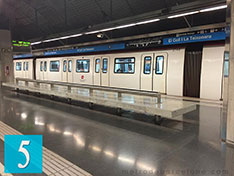
Barcelona metro L5
From the municipality of Cornella de Llobregat to the district of Horta-Guinardó, via the Sagrada Familia and the Passeig de Gracia, the Barcelona metro line 5 (blue line) covers a total of 27 stations.
More than just simplifying some of the essential itineraries for visiting Barcelona's must-sees, such as going to the FC Barcelona stadium (Camp Nou) to the Sagrada familia, or from the modernist Sant Pau complex to the Passeig de Gracia, this metro line also provides access to the towns of l'Hospitalet de Llobregat and Esplugues.
Connected to Renfe train lines at Cornella Centre and Sants Estacio stations, to the Ferrocarrils (FGC) at Diagonal station, as well as to the city's tramway networks from the Ernest Lluch or Verdaguer stops, for example, the L5 line offers a large number of routes among Barcelona's public transport services.
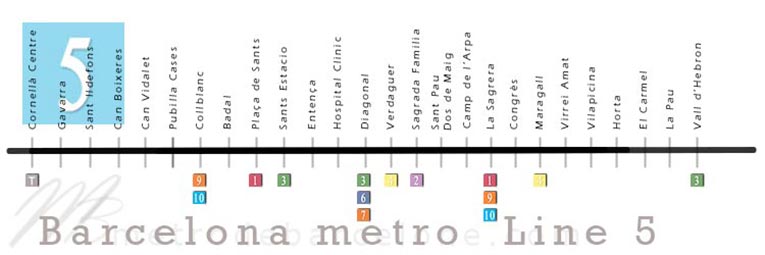
On this metro line
-
Camp Nou
Sagrada Familia
Plaça de Sants
Diagonal Avenue
Passeig de Gracia
Casa Mila
Rambla Catalunya
-
Palau Robert
Complex Sant Pau
Gracia district
Sants station
Industrial Parc
Sants district
Barcelona bunker
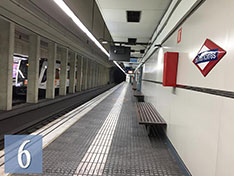
Barcelona metro L6
From Barcelona's historic centre, where the Ramblas, Plaça Catalunya, Gothic Quarter and Passeig de Gracia can be found side by side, to the Sarrià district, passing by that of Gracia, the Barcelona metro line 6 forms part of the lines taken over by the FGC (Ferrocarrils de la Generalitat de Catalunya).
A small, violet-coloured line, the Barcelona metro's line 6 only has 8 stations and runs between the Plaça Catalunya and Sarrià stops on the city's higher ground.
Connectée aux lignes S1 et S2 des Ferrocarils qui facilitent l'accès au parc naturrel de Collserola, as well as to Renfe train lines at the Plaça Catalunya stop, and many metro lines, the L6 line of the Barcelona metro offers a wide range of routes for visiting Barcelona, its surrounding areas, as well as multiple monuments such as the Casa Batllo or the Casa Milà.
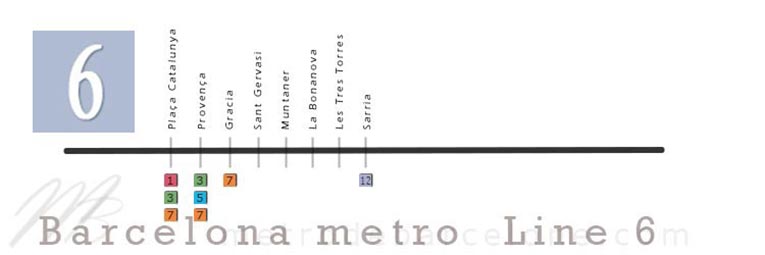
On this metro line
-
Plaça Catalunya
The Ramblas
Rambla Catalunya
Gothic Quarter
Passeig de Gracia
Casa Mila
Casa Batllo
-
Palau Robert
Diagonal Avenue
Gracia district
Sarria district
Plaça Universitat
Puerta del Angel
The Cathedral
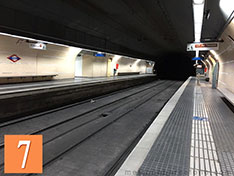
Barcelona metro L7
Identical to the L6 line, the Barcelona metro line L7 is part of the FGC network. It is also short-distance, and benefits of the same connections with the trains of Plaça Catalunya as well as with the metro and ferrocarrils..
The line 7, which only has 7 stations, runs from Plaça Catalunya to Avenida del Tibidabo, bringing you close to the amusement park of the same name.
This metro line also provides easy access to the heart of the Gracia district, as well as all the monuments and tourist sites scattered from the Passeig de Gracia to the Gothic Quarter.
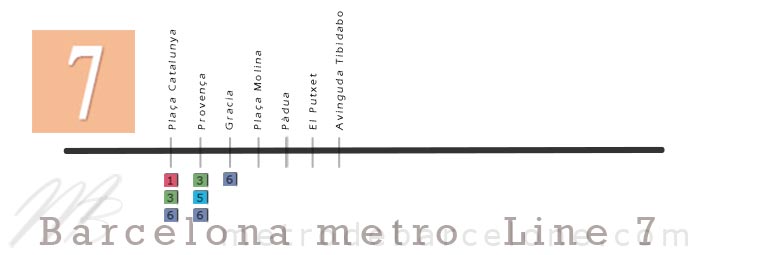
On this metro line
-
Cosmo Caixa
Tibidabo Avenue
Passeig de Gracia
Casa Mila
Casa Batllo
Puerta del Angel
Sarria district
-
Plaça Catalunya
The Ramblas
Rambla Catalunya
Gothic Quarter
Diagonal Avenue
Gracia
The Cathedral
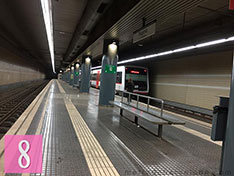
Barcelona metro L8
Waiting for its extension to reach the L6 and L7 lines at the Gracia district level, the Barcelona metro line 8, which is also part of the FGC network, has as starting point the Plaça Espanya station and go to the ‘Moli Nou - Ciutat Cooperativa’ stop.
On a total of 11 stations, which stretch from Barcelona to the town of Sant Boi, only 2 steps from the magnificent Colonia Guell, the L8 metro line passes through the municipality of l'Hospitalet de Llobregat at the foot of the Fira Gran Via, ainsi que la ville de Cornella de Llobregat, very close to the RCD Espanyol stadium.
Connected to the L1, L3, L9 and L10 lines at L'Hospitalet Av Carrilet, Europa Fira, Ildefons Cerdà and Plaça Espanya stations, this line not only allows you to get to many of the city's must-see places from the suburbs it serves, but also to access Barcelona airport terminals by making a single connection.
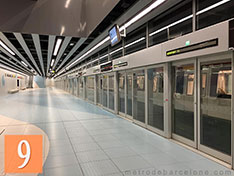
Barcelona metro L9
While waiting for the union of the 2 sections that form the line, the Barcelona metro line 9 is currently divided between the northern and southern sections. From Zona Universitaria to the ‘Aeroport T1’ stop, the 15 stations that form the L9 South section of the line lead to the two airport terminals (Josep Tarradellas Barcelona-El Prat Airport) passing through the municipalities of Prat de Llobregat and l'Hospitalet de Llobregat ; This line also provides access to either the Fira Gran Via or the Camp Nou stadium. It is connected to the L3, L5, L8 and L10 metro lines., the T1, T2 and T3 tramway lines, as well as Renfe's R2, R2 Nord and R2 Sud train lines and a number of Ferrocarils lines at Europa Fira station. The 9 stops that constitute the section of the L9 North line, and stretching from La Sagrera to Can Zam, connect the Catalan capital with the municipality of Santa Coloma de Gramenet. This part of the line 9 is connected to the L1, L5 and L10 metro lines.
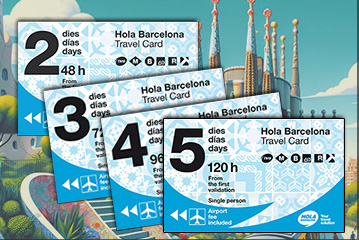
Barcelona Hola metro pass
Barcelona unlimited public transport card
From 2 to 5 days, the Hola card is the best option to visit Barcelona without stress, with unlimited access to public transport. From metro to tram, bus (TMB) or Montjuic funicular, not forgetting zone 1 trains, the Hola Barcelona card also includes transport between airport and Barcelona city centre.
 Connected to the whole of the Catalan capital's bus, tram, train and funicular network, the Barcelona metro's 12 lines offer a large number of solutions for travelling from monuments to tourist attractions, at the four corners of the city.
Connected to the whole of the Catalan capital's bus, tram, train and funicular network, the Barcelona metro's 12 lines offer a large number of solutions for travelling from monuments to tourist attractions, at the four corners of the city.
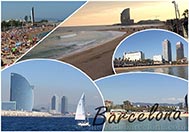 metrodebarcelone.com, your Barcelona travel guide
metrodebarcelone.com, your Barcelona travel guide


